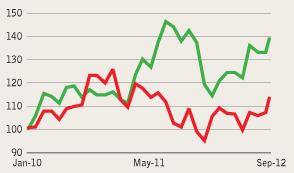Ups and downs
Burma’s currency strengthened very slightly this week; the Burmese kyat was selling on Friday at 971 to the US dollar, while buying at 968. The price of gold fell noticeably this week from 669,000 kyat per tical to 662,000. Fuel remains constant: petrol 820 kyat; diesel 950 kyat; and octane 950 kyat per litre. High-quality Pawsanhmwe rice is still 1,300-1,700 kyat per basket, while low-quality Manawthukha rice is set at 900 kyat per basket at most Rangoon markets.
MPT launches 3G SIM cards
Myanmar Post and Telecommunications (MPT) has launched 3G SIM cards priced at 1,500 kyat (US$1.50), in retail shops across the country. Customers must submit an ID card and two passport photos to acquire a card. State provider MPT finds the new Burmese telecoms market a battleground with strong competition from international players Ooredoo and Telenor. Retail outlets Elite, Tamoenye, Chan-Thar and Asia Mega Link will be among those selling MPT SIM cards.
Indonesian firm finds cracks in cement deal
Indonesian state-run cement producer Semen Indonesia (SMGR) may postpone plans to expand into Burma until next year due to difficulties in negotiating with its local partner, Jakarta Post reported on Monday, citing the firm’s finance director Ahyanizzam. He did not disclose the name of the local partner, but said that SMGR proposed to have at least a 20 percent stake in the joint venture as well as the rights to be the operator and the distributor of the products.
Ten new markets to be built in Rangoon
Ten new sites have been marked as marketplaces by Rangoon municipality: in North Dagon, Dagon Seikkan, Tharkayta, Daw Pon, Thingangyun, Hlaing Tharyar, Shwe Pyi Thar and Insein townships. The markets are to be built in the 2014-15 fiscal year with a budget of 1.3 billion kyat (US$1.3 million). There are currently 80 ordinary markets and 11 tax-free markets in the Rangoon city area.
[related]
Dawei SEZ to resume in November
The Dawei Special Economic Zone (SEZ) will resume in early November, state-backed New Light of Myanmar reported on Friday. London-based consultants Ernst & Young met with Burma’s Ministry of Transport in Naypyidaw on Thursday to present a “final due diligence report”. The development has faced strong public opposition, and will include construction of a highway, sea port, industrial zone, power plant, housing, water supply and communications stations.
Cummins to provide hybrid power in Burma
US-based Cummins Power Generation has announced that it has entered into a contract with Irrawaddy Green Towers (IGT) to provide hybrid power in Burma. It says it will provide solar and battery hybrid and diesel generator power solutions for over 750 cell towers in the country. With IGT operating the telecom towers for Telenor mobile networks in Burma, Cummins is expected to provide power solutions for the network. It is also the leading power supplier for the Ooredoo mobile network throughout Burma.
China’s Exim to upgrade Kachin railway
China’s Exim Bank will provide loans to Burma for upgrades on the Mandalay-Myitkyina railway in the country’s north, according to an official from Myanmar Railways. The poorly-maintained tracks are prone to derailment and are in dire need of repair, the official said. China’s Exim has also vowed to finance road upgrade projects in southeastern Burma and elsewhere.
Burma to open three new border trade stations
Burma will open three new border trade stations to promote commerce with Thailand and India, an advisor to the trade minister said. Two stations will open on the Thai border: one at Maese, Karenni State; and another at Maw Taung in Tenasserim Division. The third will be at the Htantalan crossing from Chin State to India. Burma has a surplus in border trade this year, with an export value of US$2.9 billion and an import value of US$1 billion. There are now 15 official border trade stations in Burma, with Bangladesh, China, India and Thailand.
Burma ranks near bottom in global competitiveness report
Burma was ranked 134 among 148 countries in a Global Competitiveness Report 2014-15, released by the World Economic Forum on 3 September. The report reviewed the competitiveness of countries based on the paradigms of education, governance, technology, institutions, market efficiency, infrastructure and innovation. It said some of the most “problematic factors” that hinder business growth in Burma are political instability, corruption, inadequate educated workforce and access to finance.



